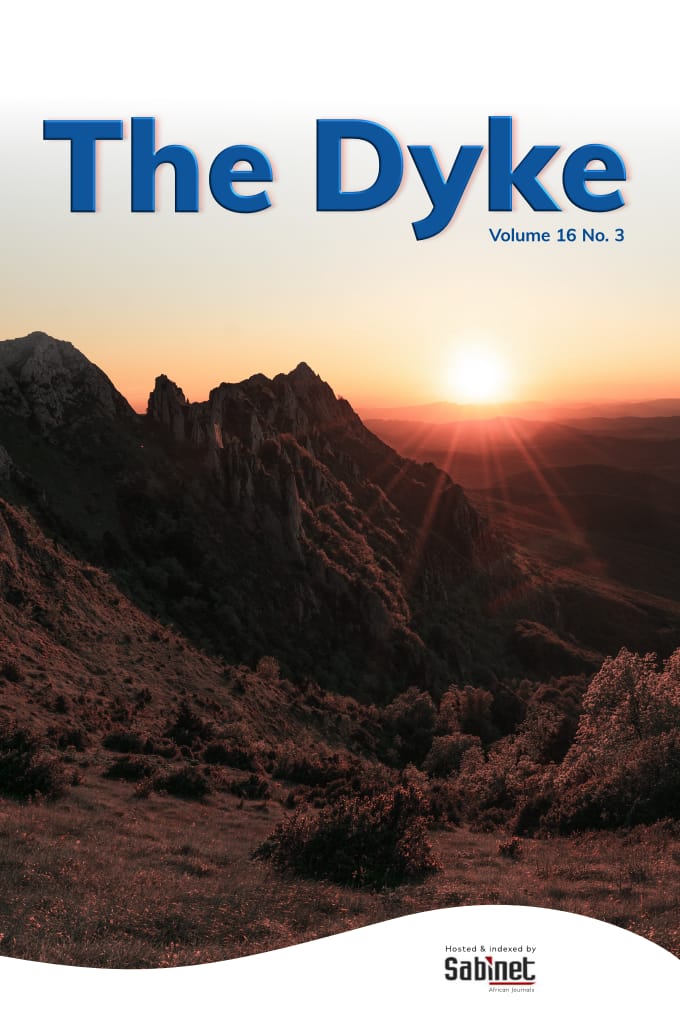Covid-19: Impact on religion and spirituality in Zimbabwe
DOI:
https://doi.org/10.64754/thedyke.v16i3.18Keywords:
Religion, Spirituality, Medicine, Covid-19Abstract
In an attempt to come up with an informed interpretation of Christian spirituality within the Corona Virus pandemic (Covid-19), this article addresses the following objectives; reflection on theodicy, why God allowed Covid-19 to happen, exposing how Christian community reacted to the phenomenon and assessing Christianity as a complementary medicine during the prevalence of the pandemic virus. Mixed method design of the qualitative and quantitative approach was adopted with a sample size constituting 14 participants. The primary and secondary data were sourced from the bible, newspapers, articles, internet material as well as telephone interviews. The study found that the experiences of Covid-19 implied affirmations that God punishes the humanity against sin, fulfils biblical prophecies, posed trial and spiritual growth and insinuated that it was God pulling the church and state to the round table. Other issues are that the church got to appropriate and maximise the technological era, partake in the paradigm shift of religious worship in traditions and practices and God’s intervention. The study concludes that humanity is religious and Christian religion provided the necessary remedy, such as healing, to cope with Covid-19.
References
Allport, G. W. and Ross, J. M. 1967. Personal religious orientation and prejudice. Journal of Personality and Social Psychology, 5(4) pp. 432-443.
Balkhair, A. A. 2020. Covid-19 pandemic: A new chapter in history of infectious disease: Oman Medical Journal 35(2): e123.
Casidy, R. and Tsarenko, Y. 2014. Perceived benefits and church participation: A comparative study among regular and irregular church goers. Article in Asia Pacific journal of marketing of logistics. November 2014. pp. 1-19.
Fitzpatrick, S. J. et al. 2016. Religious perspectives on human suffering: Implications formedicine and bioethics. Journal of Religion and Health, 55:159–173.
Foucault, M. 1977. Power/Knowledge Selected Interviews and Other Writings 1972-1977. New York: Panthen Books.
Gorsuch, R. L. 1994. Toward motivational theories of intrinsic religious commitment. Journal for the Scientific Study of Religion, 33(4), pp. 315-325.
Hauerwas, S. 1991. Naming the silences: God, medicine, and the problem of suffering. Grand Rapids, MI: William Eerdmans.
Koenig, H. G. 2000. Religion, spirituality, and medicine: Application to clinical practice.Journal of the American Medical Association, 284, 1708.
Juola, J. & Rose, E. E. 2005. Religious and spiritual struggles: In Paloutian, R. F. and Park, C. L.(eds.). Handbook of Psychology of religion and spirituality. New York: The Guilford Press. pp. 315-330.
Longman II, T. et al. 2013. The Baker illustrated Bible dictionary. Baker Publishing Group. Washington.
Maponga, J. 2020. Life happens: How the virus has affected. SAfm. Retrieved from https://iono.fm
The NewsDay, 2020. ‘Muchinguri touches raw nerve The NewsDay 16 March 2020.
The NewsDay, 2020. Churches declare end of Covid-19 The NewsDay 16 June 2020.
Oman, D. and Thoresen, C. E. 2003a. The many frontiers of spiritual modelling. The International Journal for the Psychology of Religion, 13, 197–213.
Quadri. S. A. 2020. Covid-19 and religious congregations: Implications for spread of novel pathogens. International Journal of Infectious Diseases 96 219–221.
Rowatt, W. C. and Kirkpatrick, L. A. 2000. Two dimensions of attachment to God and their relation to affect, religiosity, and personality constructs. Journal for the Scientific Study of Religion, 41, 637–651.
Spilka, B. and McIntosh, D. N. 1996. Religion and spirituality: The known and the unknown. Paper presented at the annual conference of the American Psychological Association, Toronto, Canada.
Sulkowski. L. and Ignatowski. G. 2020. Impact of Covid-19 Pandemic on organization of religious behaviour in different Christian; Religions 2020, 11, 254; doi:10.3390/rel11050254. pp. 1-15.
Targ, E. 1997. Evaluating distant healing: A research review. Alternative Therapies in Health and Medicine, 3, 74–78.
Vaughan, F. 1991. Spiritual issues in psychotherapy. Journal of Transpersonal Psychology, 23,i 105–119.
WHO. 2020. www.http://wa.me/41798931892?text=hi
WHO. 2020. Practical considerations and recommendations for religious leaders and faith-based communities in the context of Covid-19: Article on interim guidance, CC BY-NC-SA 3.0 IGO: 1-6.
Wong, P. T. and Weiner, B. 1981. When people ask “why” questions, and the heuristics of attributional search. Journal of Personality and Social Psychology, 40, 650–663.
Waters, L. J. 1997. Reflections on suffering from the book of Job: Bibliotheca sacra 154(October–December 1997): 436–51.
Wildman, W. J., Bulbulia, J., Sosis, R. and Schjoedt, U. 2020. Religion and the Covid-19 pandemic, Religion, Brain & Behavior, 10:2, 115-117, DOI: 10.1080/2153599X.2020.1749339.
ZBC, 2020. Covid-19 team visits Madzibaba with 30 wives, 23 children. zbcnews.co.zw/covid-19.
ZCTU, 2020. Response to the impact of COVID-19 (coronavirus) pandemic on workers and the Zimbabwean economy, March 31, 2020 https://www.ituc-csi.org/zimbabwe-response-to-the-impact-of.

Downloads
Published
How to Cite
Issue
Section
License
All articles in The Dyke are published under the Creative Commons Attribution 4.0 International License (CC BY 4.0).
Under this licence:
- Others may copy, redistribute, remix, transform, and build upon the work for any purpose, even commercially.
- Appropriate credit must be given to the original author(s) and source (The Dyke), along with a link to the license.
- Any changes made must be indicated.
Full licence details: https://creativecommons.org/licenses/by/4.0/
Archiving and Preservation
The Dyke supports long-term preservation of scholarly work through partnerships with digital repositories and indexing services, including Sabinet African Journals. Authors are also encouraged to deposit a copy of their published article in institutional or subject-specific repositories.




